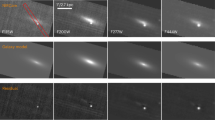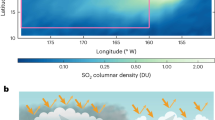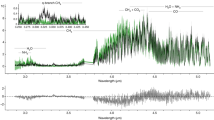Abstract
THE solar eclipse of May 20, 1966, was observed by the U.S. Naval Research Laboratory's 1965 93 A satellite and telemetered at Arcetri. This observation, so far as we know% is the first one performed by an orbiting device.
This is a preview of subscription content, access via your institution
Access options
Subscribe to this journal
Receive 51 print issues and online access
$199.00 per year
only $3.90 per issue
Buy this article
- Purchase on Springer Link
- Instant access to full article PDF
Prices may be subject to local taxes which are calculated during checkout
Similar content being viewed by others
References
Kreplin, R. W., Final Data and Calibrations for the Explorer 30 (NRL SOLRAD 8) (U.S. Naval Research Laboratory, 1966).
Tousey, R., Purcell, J. D., and Snider, C. B., “Some Recent XUV Spectroheliograms”, paper presented at the Conference on “UV and X-ray Spectroscopy”, Culham, England (1966).
Author information
Authors and Affiliations
Rights and permissions
About this article
Cite this article
LANDINI, M., RUSSO, D. & TAGLIAFERRI, G. Solar Eclipse of May 20, 1966, observed by the Solrad 8 Satellite in X-ray and Ultra-violet Bands. Nature 211, 393–394 (1966). https://doi.org/10.1038/211393a0
Issue Date:
DOI: https://doi.org/10.1038/211393a0
This article is cited by
-
Absorption of radio waves during a solar eclipse
Journal of Earth System Science (1986)
-
Soft x-ray emitting regions in the solar corona
Solar Physics (1971)
-
Distribution of X-ray Emission from the Sun deduced from Measurements of Ionospheric Absorption
Nature (1968)
-
16?40 � coronal X-ray emission during the 12 November 1966 eclipse
Solar Physics (1968)
Comments
By submitting a comment you agree to abide by our Terms and Community Guidelines. If you find something abusive or that does not comply with our terms or guidelines please flag it as inappropriate.



